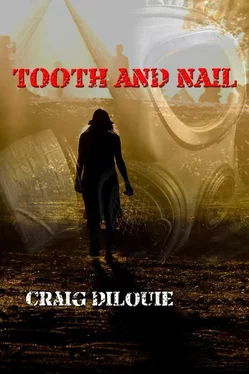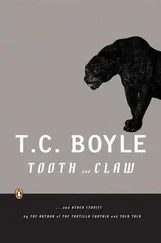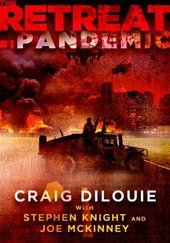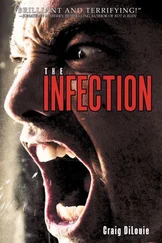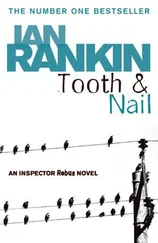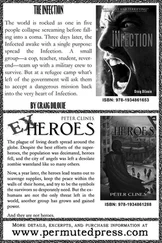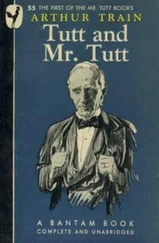“Sarge gave him sack time,” says Hicks.
“All right,” Eckhardt says. “We scoped out the last classroom on the left and got everything set up there. We found an American flag. You got something to cover up your guys?”
“We’ll make do,” Hicks tells him. “You lead. We’ll follow you.”
Together, they bring the bodies into the classroom. All of the desks have been pushed against the walls, which are adorned with posters of animals, a human skeleton with all of his bones labeled, and a skinless man with all of his muscles labeled.
Earlier in the day, one of the boys wrote on the chalkboard:
here lies pfc william chen. he was a good soldier and loyal friend. he will be missed. may his death be a lesson to us that while there is life there is hope.
RIP
Mooney and the other boys pause for a moment to read the message. They grunt, impressed. They set down the body bag and unzip it.
The boys stagger back, gagging.
“Like rotten cheese and eggs,” says Finnegan, retching.
“Is he alive?” says Rollins. “He’s moving!”
“Quiet, he’s trying to say something. . . .”
“Jesus,” Mooney says, swallowing hard to force back his bile. “Some flies got on him before we zipped him up and laid eggs in him. His face is moving because it’s filled with maggots. ”
“Damn,” says Rollins, paling.
“Zip him up, Mooney, goddamnit,” Eckhardt orders.
Mooney closes the bag.
“Still stinks in here,” says Corporal Wheeler.
“Not as bad, though,” Eckhardt points out.
“Smells like one of my farts after I get the MRE with chili and beans,” says Wyatt.
“Joel, shut up,” Mooney says, feeling light headed at the mention of food. “Just stop talking.”
The boys push several of the student desks together and lay the bodies on top of them.
“Check this out,” says Williams. “Somebody carved into this desk, ‘screw mr. schermerhorn.’ That’s all right.”
Nobody laughs. Eckhardt drapes the American flag over the three body bags.
The carvings on the desks give Mooney the creeps. The memory of the normal world haunts this school in a very real way. It is too easy to close one’s eyes and picture thirty bored teenagers trying to stay awake so they can figure out what their biology teacher is telling them.
Standing here in this classroom makes him feel like he is in a museum.
Eckhardt and Hicks eulogize the boys who were killed while everybody else says their own farewells by placing their right hands over their hearts, a gesture of respect they learned from the Iraqis. Eckhardt says he didn’t know Billy Chen well, apparently nobody did, but Chen was Army and that made him family. Hicks describes Hawkeye’s uncanny marksmanship, which very likely would have destined him to become a sniper if he wanted to make the Army a career. Tells how Hawkeye always got stuck on point and never complained about that or anything else. Wheeler and Williams make them laugh by describing jokes McLeod would play on The Newb while he was asleep—tying his shoelaces together, dunking his hand in warm water—the usual barracks pranks. Eckhardt says each of these men died for their country.
The boys glance at each other, uncomfortable. What does that mean anymore? They know what dying means, they’ve seen enough of it, and it is not hard to imagine themselves rotting inside those body bags instead of their friends, infested with maggots. But what country? Most of them are in a state of flat denial but even they know America is going through a crisis from which it will emerge looking entirely different. What comes out the other side, in fact, may no longer be recognizable anymore as “America.”
An awkward silence descends upon the funeral. Nobody knows what to say.
“What if it’s true?” Ratliff says hesitantly, obviously afraid he will be ridiculed for saying something this honest.
“How can it be true?” Wyatt says. “A bunch of unarmed Hajjis can’t just wipe out a battalion.”
“Why would they be making that shit up for, dawg?” Williams says. “To boost your morale? You all know it’s true but you just don’t want to face it.”
Nobody answers him.
“Well, if it’s true, then what are we supposed to do with one lousy company?”
“Keep our heads down, if we’re smart,” Williams tells him.
“You got that right,” some of the other boys murmur, nodding.
The other boys chime in.
“Give this thing a chance to blow over.”
“Wait. We’re going to be okay, aren’t we? Right?”
“They’re not going to airlift us out?”
“Don’t count on it. Where would they land the birds—outside in the street?”
“We got good people leading us,” Hicks says. “We should be okay.”
“Captain Lyons was good,” Rollins says. “And now Alpha’s gone.”
“And Reese. And Moreno. They were good, too.”
“They were following orders. Kirkland and Winters told them to march and they marched.”
“Exactly my point. What if they call up LT and tell him to march?”
“If I was LT, I wouldn’t even answer the phone.”
“I know the LT,” Eckhardt says. “He’ll follow his orders.”
“If the Army is in this bad shape, why should he risk his neck?” Williams says.
“Why should any of us?” says Ratliff.
The boys fall into another awkward silence.
Finally, Mooney says, “You guys are going to laugh, but I’m sticking with the LT because I want to see kids go to school here again.”
Nobody laughs. The boys watch him curiously.
He says: “It’s like this. . . . Billy Chen died fighting for his country. Seems to me that country is disappearing around us. If it keeps going, we might end up being all that’s left of it. We walk away from our jobs, then America is gone. That’s how I feel about it. So I’m going to do my job and keep America alive long enough so it can get back on its feet and be normal again some day. That’s my mission.”
The boys shift restlessly, murmuring and nodding. Mooney has planted a seed in their minds stronger than patriotism. He is giving them a condition for victory in this war without heroes, without winners. He is reminding them of home at peace.
They are picturing picnics and pickup trucks, girlfriends and first dates, street hockey and drive-in movies, granddads playing checkers in the park, long drives on summer nights, a favorite song on the radio, arguments about politics, getting up early for church on Sunday, holding jobs and cashing paychecks. Even the petty worries and needs that no longer seem important—like bills to pay and credit cards and what everybody else is wearing and the latest street slang—all of it strikes the boys deep in the soul, making them nostalgic for the mundane world that is ending.
There is a difference between going to Iraq to fight for your country and being in the situation they are in now, literally fighting for your country’s survival. If they can keep even a shred of the old America alive, they feel like they will win.
Mooney wants to stay alive, and there is safety in numbers. But it is not enough to stay alive. A man must also have something for which he wants to live as well.
Chapter 11
I want to tell my story first so you won’t forget me
The only thing that kept us alive so long was the small firing zones. The Maddies had to bunch up and for a while there, we were shooting fish in a barrel. They came at us in twos and threes out of doorways, around corners, out of cars—they even came flying out of windows. We had maybe sixty men when we stepped off. We were armed to the teeth and cleared hot to shoot anything that moved. No identifying targets. Just shoot and scoot. We also had a good leader. Captain Reese was a damn good officer and I would have followed him anywhere, even after he cracked. It took us a while to get used to the fact the enemy wasn’t shooting back at us. After that, we went to town.
Читать дальше
